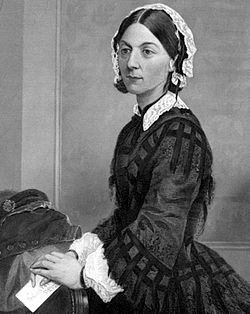A-B



- Lydia Abell ARRC (1872-1959) Australian civilian and military nurse during the First World War
- Judith Adams (1943–2012) Australian nurse, midwife and politician
- Justus A. Akinsanya Professor of Nursing and Fellow of the Royal College of Nursing
- Saint Alda (died c. 1309), Italian Catholic saint
- Moyra Allen (1921–1996), helped develop the McGill Model of Nursing
- Allen Allensworth (1842–1914) famous African-American American Civil War soldier who started as a nurse
- Annie Altschul (1919-2001) Britain's mental health nurse pioneer
- Margaret Irene Anderson (1915–1995) Australian Army nurse
- Pixie Annat (1930-2022) Australian Matron and Queensland Great
- Olive Anstey CBE (1920–1983) Australian nurse
- Sir Jonathan Asbridge, first president of the UK's Nursing and Midwifery Council
- Charles Atangana (1880–1943), paramount chief of the Ewondo and Bane in Cameroon
- Margaret Auld (1932 -2010) Chief Nursing Officer for Scotland 1977-1988
- Martha Ballard (1735–1812), American frontier midwife, great-aunt of Clara Barton
- Anna Baillie RRC (1864–1958) established the first provincial Preliminary Training School for Nurses, and served as a Principal military Matron of Bristol during the First World War.
- Anna DeCosta Banks, (1869-1930) first head nurse at the Hospital and Training School for Nurses in Charleston, South Carolina
- Doris Bardsley (1895-1968) Australian nurse, President of the Australasian Trained Nurses' Association
- Williamina Barclay (1883–1975) Scottish nurse; one of the main initiators of the evacuation of St Kilda archipelago
- Kathleen Hope Barnes ARRC MBE (1909–1981) Australian nurse
- Ellen Barron (1875–1951) Australian matron
- Nita Barrow (1916–1995), 5th Governor-General of Barbados who started as a nurse midwife and public health educator
- Clara Barton (1821–1912), organized the American Red Cross
- Dora Isabel Baudinet (1883–1945) Australian nurse
- Dame Doris Beale, DBE, RRC & Bar (1889 –1971) Matron-in-Chief of Queen Alexandra's Royal Naval Nursing Service
- Ethel Hope Becher GBE, RRC & Bar (1867–1948), Matron in Chief of Queen Alexandra's Imperial Nursing Service
- Christine Beasley CBE (born 1944), Chief Nursing Officer for England
- Irene L. Beland (1906–2000), American nursing educator, author of Clinical Nursing: Pathophysiological and Psychosocial Approaches
- Jane Bell OBE (1873–1959) Scotland-born Australian principal matron of the First Australian General Hospital in Egypt in First World War
- Agnes Jessie Bennett (1880-1969) Australian nurse
- Isabel Bennett RRC (1862-1922), civilian matron and during First World War ran an annexe for injured officers.
- Ann A. Bernatitus (1912–2003), one of the Angels of Bataan - USN nurses in the Philippines in WW2
- Claire Bertschinger Swiss-British nurse who inspired the Band Aid charity movement
- Mary Ann Bickerdyke (1817–1901), nurse during the American Civil War known as "Mother Bickerdyke"
- Louisa Bicknell (1879–1915) Australian civilian and military nurse
- Martha Bidmead RRC (1862–1940) Australian nurse
- Dame Emily Mathieson Blair DBE, RRC (1890 – 1963) was a British military nurse and nursing administrator
- Florence Blake (1907–1983), American pediatric nursing professor and author
- Florence A. Blanchfield (1884–1971), superintendent of the United States Army Nurse Corps
- Isla Blomfield (1865-1959) Australian nurse
- Cecilia Blomqvist (1845–1890), Finnish deaconess
- Kath Bonnin (1911-1985) was an Australian army nurse during WW2 [1]
- Doris Booth (1895-1970) Australian nursing volunteer
- Angela Boškin (1885–1977), first professionally trained Slovenian nurse and social worker in Yugoslavia
- Hilda Bowen (1923–2002), credited with establishing the modern nursing profession in The Bahamas
- Peggy Boyd (1905–1999), one of Scotland's first air ambulance nurses; served during World War II
- Jo Brand (born 1957), British nurse-turned-comedian
- Elsa Brändström (1888–1948), Swedish World War I Red Cross nurse in Siberia
- Sister Philippa Brazill (1895–1988) Sister of Mercy, Australian nurse and hospital administrator
- Mary Carson Breckinridge (1881–1965), founder of the Frontier Nursing Service
- Daisy Bridges CBE (1894-1972) British nurse and midwife, known for being International Council of Nurses General Secretary
- Louisa Briggs (1836–1925) Australian nurse and, Aboriginal leader and activist
- Mary Francis Bridgeman (1813–1888), nun and Crimean War nurse
- Ellen Johanne Broe (1900–1994) Danish nurse and nursing educator
- Anna Broms (1862–1890), first professionally trained nurse in Finland
- Sidney Browne (1850-1941), first Matron-in-Chief of the Queen Alexandra's Imperial Military Nursing Service and first President of the Royal College of Nursing
- Viola Davis Brown (1936–2017), first African-American to lead a state office of public health nursing in the United States
- Abraão José Bueno (born 1977), Brazilian nurse and serial killer
- Carrie E. Bullock (1887–1962), African American nurse
- Vivian Bullwinkel (1915–2000), lone survivor of the Banka Island Massacre, celebrated by the Australian Service Nurses Memorial
- Beryl Burbridge OBE (1902-1988) Australian military matron
- Elizabeth Burchill (1904–2003) was an Australian nurse, philanthropist and author
- Mercia Butler (1933–1990) Indigenous Australian nurse and nun








